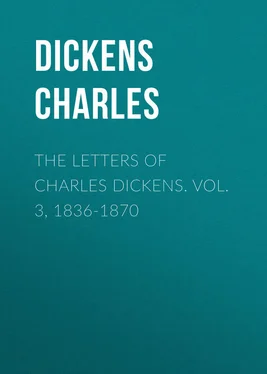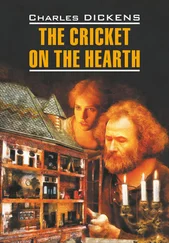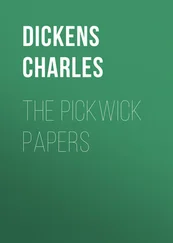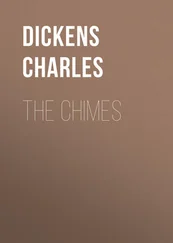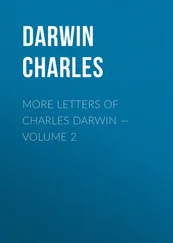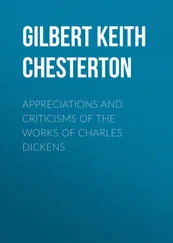Чарльз Диккенс - The Letters of Charles Dickens. Vol. 3, 1836-1870
Здесь есть возможность читать онлайн «Чарльз Диккенс - The Letters of Charles Dickens. Vol. 3, 1836-1870» — ознакомительный отрывок электронной книги совершенно бесплатно, а после прочтения отрывка купить полную версию. В некоторых случаях можно слушать аудио, скачать через торрент в формате fb2 и присутствует краткое содержание. Жанр: foreign_antique, foreign_prose, на английском языке. Описание произведения, (предисловие) а так же отзывы посетителей доступны на портале библиотеки ЛибКат.
- Название:The Letters of Charles Dickens. Vol. 3, 1836-1870
- Автор:
- Жанр:
- Год:неизвестен
- ISBN:нет данных
- Рейтинг книги:4 / 5. Голосов: 1
-
Избранное:Добавить в избранное
- Отзывы:
-
Ваша оценка:
- 80
- 1
- 2
- 3
- 4
- 5
The Letters of Charles Dickens. Vol. 3, 1836-1870: краткое содержание, описание и аннотация
Предлагаем к чтению аннотацию, описание, краткое содержание или предисловие (зависит от того, что написал сам автор книги «The Letters of Charles Dickens. Vol. 3, 1836-1870»). Если вы не нашли необходимую информацию о книге — напишите в комментариях, мы постараемся отыскать её.
The Letters of Charles Dickens. Vol. 3, 1836-1870 — читать онлайн ознакомительный отрывок
Ниже представлен текст книги, разбитый по страницам. Система сохранения места последней прочитанной страницы, позволяет с удобством читать онлайн бесплатно книгу «The Letters of Charles Dickens. Vol. 3, 1836-1870», без необходимости каждый раз заново искать на чём Вы остановились. Поставьте закладку, и сможете в любой момент перейти на страницу, на которой закончили чтение.
Интервал:
Закладка:
What do you think of Mrs. Gamp? And how do you like the undertaker? I have a fancy that they are in your way. Oh heaven! such green woods as I was rambling among down in Yorkshire, when I was getting that done last July! For days and weeks we never saw the sky but through green boughs; and all day long I cantered over such soft moss and turf, that the horse's feet scarcely made a sound upon it. We have some friends in that part of the country (close to Castle Howard, where Lord Morpeth's father dwells in state, in his park indeed), who are the jolliest of the jolly, keeping a big old country house, with an ale cellar something larger than a reasonable church, and everything, like Goldsmith's bear dances, "in a concatenation accordingly." Just the place for you, Felton! We performed some madnesses there in the way of forfeits, picnics, rustic games, inspections of ancient monasteries at midnight, when the moon was shining, that would have gone to your heart, and, as Mr. Weller says, "come out on the other side."..
Write soon, my dear Felton; and if I write to you less often than I would, believe that my affectionate heart is with you always. Loves and regards to all friends, from yours ever and ever.
Very faithfully yours.My dear Sir,
I hinted, in a letter of introduction I gave Mr. Hood to you, that I had been thinking of a subject for the Edinburgh . Would it meet the purposes of the Review to come out strongly against any system of education based exclusively on the principles of the Established Church? If it would, I should like to show why such a thing as the Church Catechism is wholly inapplicable to the state of ignorance that now prevails; and why no system but one, so general in great religious principles as to include all creeds, can meet the wants and understandings of the dangerous classes of society. This is the only broad ground I could hold, consistently with what I feel and think on such a subject. But I could give, in taking it, a description of certain voluntary places of instruction, called "the ragged schools," now existing in London, and of the schools in jails, and of the ignorance presented in such places, which would make a very striking paper, especially if they were put in strong comparison with the effort making, by subscription, to maintain exclusive Church instruction. I could show these people in a state so miserable and so neglected, that their very nature rebels against the simplest religion, and that to convey to them the faintest outlines of any system of distinction between right and wrong is in itself a giant's task, before which mysteries and squabbles for forms must give way. Would this be too much for the Review?
Faithfully yours.1844
My very dear Felton,
You are a prophet, and had best retire from business straightway. Yesterday morning, New Year's Day, when I walked into my little workroom after breakfast, and was looking out of window at the snow in the garden – not seeing it particularly well in consequence of some staggering suggestions of last night, whereby I was beset – the postman came to the door with a knock, for which I denounced him from my heart. Seeing your hand upon the cover of a letter which he brought, I immediately blessed him, presented him with a glass of whisky, inquired after his family (they are all well), and opened the despatch with a moist and oystery twinkle in my eye. And on the very day from which the new year dates, I read your New Year congratulations as punctually as if you lived in the next house. Why don't you?
Now, if instantly on the receipt of this you will send a free and independent citizen down to the Cunard wharf at Boston, you will find that Captain Hewett, of the Britannia steamship (my ship), has a small parcel for Professor Felton of Cambridge; and in that parcel you will find a Christmas Carol in prose; being a short story of Christmas by Charles Dickens. Over which Christmas Carol Charles Dickens wept and laughed and wept again, and excited himself in a most extraordinary manner in the composition; and thinking whereof he walked about the black streets of London, fifteen and twenty miles many a night when all the sober folks had gone to bed… Its success is most prodigious. And by every post all manner of strangers write all manner of letters to him about their homes and hearths, and how this same Carol is read aloud there, and kept on a little shelf by itself. Indeed, it is the greatest success, as I am told, that this ruffian and rascal has ever achieved.
Forster is out again; and if he don't go in again, after the manner in which we have been keeping Christmas, he must be very strong indeed. Such dinings, such dancings, such conjurings, such blindman's-buffings, such theatre-goings, such kissings-out of old years and kissings-in of new ones, never took place in these parts before. To keep the Chuzzlewit going, and do this little book, the Carol, in the odd times between two parts of it, was, as you may suppose, pretty tight work. But when it was done I broke out like a madman. And if you could have seen me at a children's party at Macready's the other night, going down a country dance with Mrs. M., you would have thought I was a country gentleman of independent property, residing on a tiptop farm, with the wind blowing straight in my face every day…
Your friend, Mr. P – , dined with us one day (I don't know whether I told you this before), and pleased us very much. Mr. C – has dined here once, and spent an evening here. I have not seen him lately, though he has called twice or thrice; for K – being unwell and I busy, we have not been visible at our accustomed seasons. I wonder whether H – has fallen in your way. Poor H – ! He was a good fellow, and has the most grateful heart I ever met with. Our journeyings seem to be a dream now. Talking of dreams, strange thoughts of Italy and France, and maybe Germany, are springing up within me as the Chuzzlewit clears off. It's a secret I have hardly breathed to anyone, but I "think" of leaving England for a year, next midsummer, bag and baggage, little ones and all – then coming out with such a story, Felton, all at once, no parts, sledgehammer blow.
I send you a Manchester paper, as you desire. The report is not exactly done, but very well done, notwithstanding. It was a very splendid sight, I assure you, and an awful-looking audience. I am going to preside at a similar meeting at Liverpool on the 26th of next month, and on my way home I may be obliged to preside at another at Birmingham. I will send you papers, if the reports be at all like the real thing.
I wrote to Prescott about his book, with which I was perfectly charmed. I think his descriptions masterly, his style brilliant, his purpose manly and gallant always. The introductory account of Aztec civilisation impressed me exactly as it impressed you. From beginning to end the whole history is enchanting and full of genius. I only wonder that, having such an opportunity of illustrating the doctrine of visible judgments, he never remarks, when Cortes and his men tumble the idols down the temple steps and call upon the people to take notice that their gods are powerless to help themselves, that possibly if some intelligent native had tumbled down the image of the Virgin or patron saint after them nothing very remarkable might have ensued in consequence.
Of course you like Macready. Your name's Felton. I wish you could see him play Lear. It is stupendously terrible. But I suppose he would be slow to act it with the Boston company.
Hearty remembrances to Sumner, Longfellow, Prescott, and all whom you know I love to remember. Countless happy years to you and yours, my dear Felton, and some instalment of them, however slight, in England, in the loving company of
Читать дальшеИнтервал:
Закладка:
Похожие книги на «The Letters of Charles Dickens. Vol. 3, 1836-1870»
Представляем Вашему вниманию похожие книги на «The Letters of Charles Dickens. Vol. 3, 1836-1870» списком для выбора. Мы отобрали схожую по названию и смыслу литературу в надежде предоставить читателям больше вариантов отыскать новые, интересные, ещё непрочитанные произведения.
Обсуждение, отзывы о книге «The Letters of Charles Dickens. Vol. 3, 1836-1870» и просто собственные мнения читателей. Оставьте ваши комментарии, напишите, что Вы думаете о произведении, его смысле или главных героях. Укажите что конкретно понравилось, а что нет, и почему Вы так считаете.
